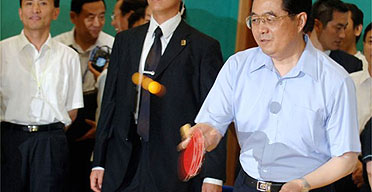
Ping-pong diplomacy is back. Reuters reports that Japanese prime minister Yasuo Fukada is shaping up to take on President Hu Jintao of China at table tennis when he arrives in Tokyo next month, the first such visit by a Chinese president for a decade, and the first such game since Fukuda's away fixture with the Chinese premier, Wen Jiabao, last year.
The prospect sounds so bland and harmless. Surely a little ball like that couldn't hurt grown men? Don't you believe it. There is little in sport more vicious than a game of croquet. An All Blacks scrum is merely physical; croquet leaves scars that do not heal. Ping-pong can be almost as bad.
Why do they put such burdens on the tiny ball? Nicholas Sarkozy does not challenge Angela Merkel to a game of squash, weightlifting or mud-wrestling. The Pope has not brought his ivory tiddlywinks set to Washington.
It must be because ping-pong got off to a good diplomatic start. Invented in 19th-century England (like most world-conquering games), it enabled Americans to set foot in Beijing for the first time after China was "lost" to communism in 1949. In 1971, there were a series of informal exchanges between top US and Chinese players at the 31st World Table Tennis Championship in Tokyo. The most famous of these was the offer of a lift on the Chinese team bus, made by ex-world champion Zhuang Zedong to the US player Glenn Cowan. A Let It Be T-shirt and a silk-screen mountain scene were exchanged. An invitation to play exhibition matches, tour the Great Wall and watch ballet followed.
Ten months later, President Nixon paid his visit to China, a diplomatic turning point that helped make China the emerging superpower it is today. Not all such events work so well. During Gordon Brown's last visit to Beijing in January, Wen challenged him to a game. Brown, perhaps conscious of his one not-very-good eye, declined. You needn't have worried, Gordon - Reuters never reports who won.

